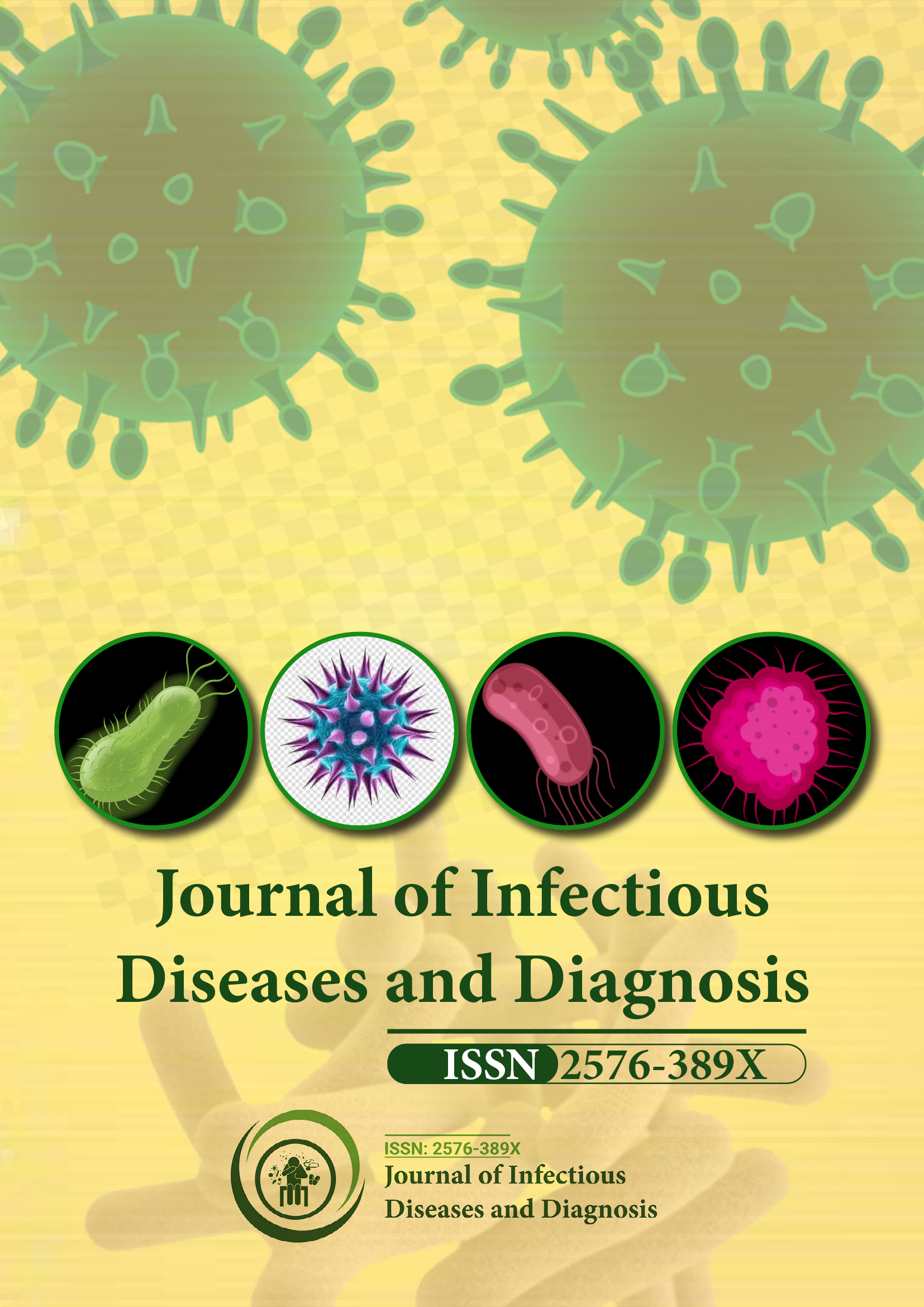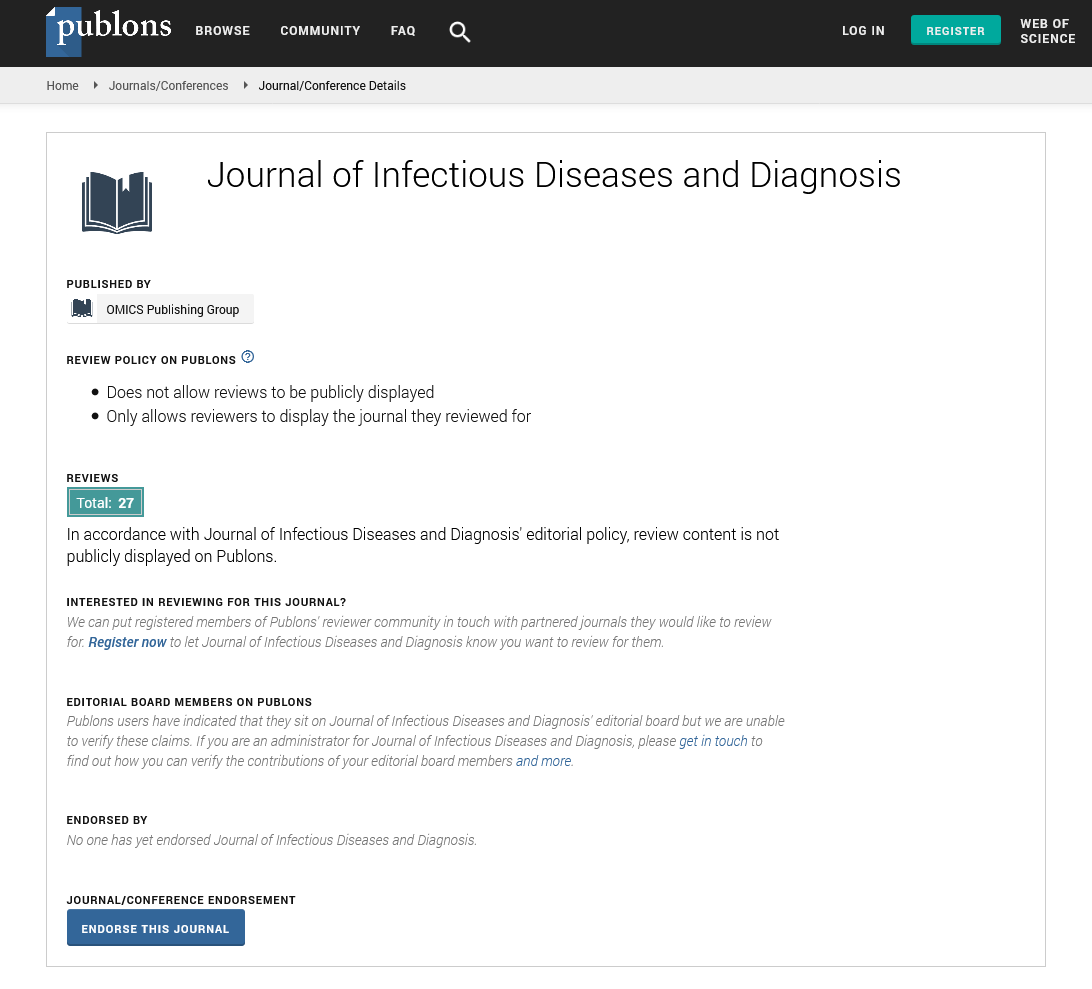Indexed In
- RefSeek
- Hamdard University
- EBSCO A-Z
- Publons
- Euro Pub
- Google Scholar
Useful Links
Share This Page
Journal Flyer

Open Access Journals
- Agri and Aquaculture
- Biochemistry
- Bioinformatics & Systems Biology
- Business & Management
- Chemistry
- Clinical Sciences
- Engineering
- Food & Nutrition
- General Science
- Genetics & Molecular Biology
- Immunology & Microbiology
- Medical Sciences
- Neuroscience & Psychology
- Nursing & Health Care
- Pharmaceutical Sciences
Commentary Article - (2024) Volume 9, Issue 4
Immunological Aspects of the Cardio Metabolic Effects of Helminth Infection and Treatment
Alem Deksisa*Received: 03-Jun-2024, Manuscript No. JIDD-24-26515; Editor assigned: 05-Jun-2024, Pre QC No. JIDD-24-26515 (PQ); Reviewed: 19-Jun-2024, QC No. JIDD-24-26515; Revised: 26-Jun-2024, Manuscript No. JIDD-24-26515 (R); Published: 03-Jul-2024, DOI: 10.35248/2576-389X.24.09.280
Description
The impact of helminth infections and their treatment on cardio metabolic diseases and associated risk factors represents a complex and significant area of study. Helminths, or parasitic worms, infect a large portion of the global population, particularly in regions with poor sanitation and limited access to healthcare. These infections are known to influence the host's immune system, which in turn can affect various aspects of metabolic health.
Helminths have a profound ability to modulate the immune system. Chronic infection with these parasites often leads to a state of immune tolerance, which can suppress inflammatory responses. This immunomodulation has been shown to impact conditions such as obesity, type 2 diabetes, and cardiovascular disease, all of which are driven by chronic low-grade inflammation. Several studies have explored the relationship between helminth infections and cardio metabolic health, providing insights into how these parasites might alter disease risk and progression.
One area of interest is the effect of helminth infections on obesity and metabolic syndrome. Helminths can influence the regulation of adipose tissue and insulin sensitivity. Some research suggests that individuals with helminth infections might have lower rates of obesity and metabolic syndrome, potentially due to the anti-inflammatory effects of these parasites. For instance, helminth-induced regulatory T cells and cytokines like IL-10 can counteract the pro-inflammatory environment typically associated with obesity and insulin resistance.
The relationship between helminth infections and cardiovascular disease is also noteworthy. Chronic inflammation is a key driver of atherosclerosis and other cardiovascular conditions. By modulating the immune system, helminths might reduce the inflammatory processes that contribute to these diseases. However, the extent to which helminth infections protect against or contribute to cardiovascular disease remains an area of active investigation.
Anthelmintic treatment, which aims to eliminate helminth infections, that which effects in terms of cardio metabolic health. On one hand, removing helminths can alleviate the burden of parasitic disease and improve overall health. On the other hand, it may also remove the immune regulatory benefits conferred by the parasites, potentially leading to an increase in inflammatory diseases. Studies have shown mixed results regarding the effects of anthelmintic treatment on cardio metabolic risk factors.
For instance, some research indicates that anthelmintic treatment can lead to an increase in Body Mass Index (BMI) and a higher risk of metabolic syndrome. This may be due to the loss of helminth-induced anti-inflammatory effects. Conversely, other studies suggest that eliminating helminth infections can improve insulin sensitivity and reduce markers of metabolic syndrome, highlighting the complex interplay between parasite load, immune function, and metabolic health.
Understanding the risk factors of these interactions is important for developing effective public health strategies. In regions where helminth infections are endemic, mass deworming programs are commonly implemented to reduce the burden of parasitic diseases. However, these programs must consider the potential unintended consequences on cardio metabolic health. It is difficult to maintain the right balance between maintaining the benefits of immunological modulation and reducing risks associated with persistent helminth infections.
Moreover, there is growing interest in the potential therapeutic use of helminth or helminth-derived products to treat chronic inflammatory and metabolic diseases. Experimental studies in animal models and early-phase clinical trials in humans have explored the use of helminth therapy for conditions such as inflammatory bowel disease, type 1 diabetes, and multiple sclerosis. These studies provide a proof-of-concept that using the immunomodulatory properties of helminths could be beneficial for managing cardio metabolic diseases.
Conclusion
In conclusion, the effects of helminths and anthelmintic treatment on cardio metabolic diseases and risk factors present a complex interplay of immune modulation and metabolic health. Helminth infections can have both protective and detrimental effects on conditions like obesity, metabolic syndrome, and cardiovascular disease. Anthelmintic treatment, while beneficial in reducing parasitic disease burden, can alter the immune environment in ways that impact cardio metabolic risk. Further research is needed to fully understand these relationships and to develop strategies that maximize health benefits while minimizing adverse outcomes. This area of study highlights the importance of considering the broader implications of parasitic infections and their treatment on overall health and disease risk.
Citation: Deksisa A (2024) Immunological Aspects of the Cardio Metabolic Effects of Helminth Infection and Treatment. J Infect Dis Diagn. 9:280.
Copyright: © 2024 Deksisa A. This is an open-access article distributed under the terms of the Creative Commons Attribution License, which permits unrestricted use, distribution, and reproduction in any medium, provided the original author and source are credited.

